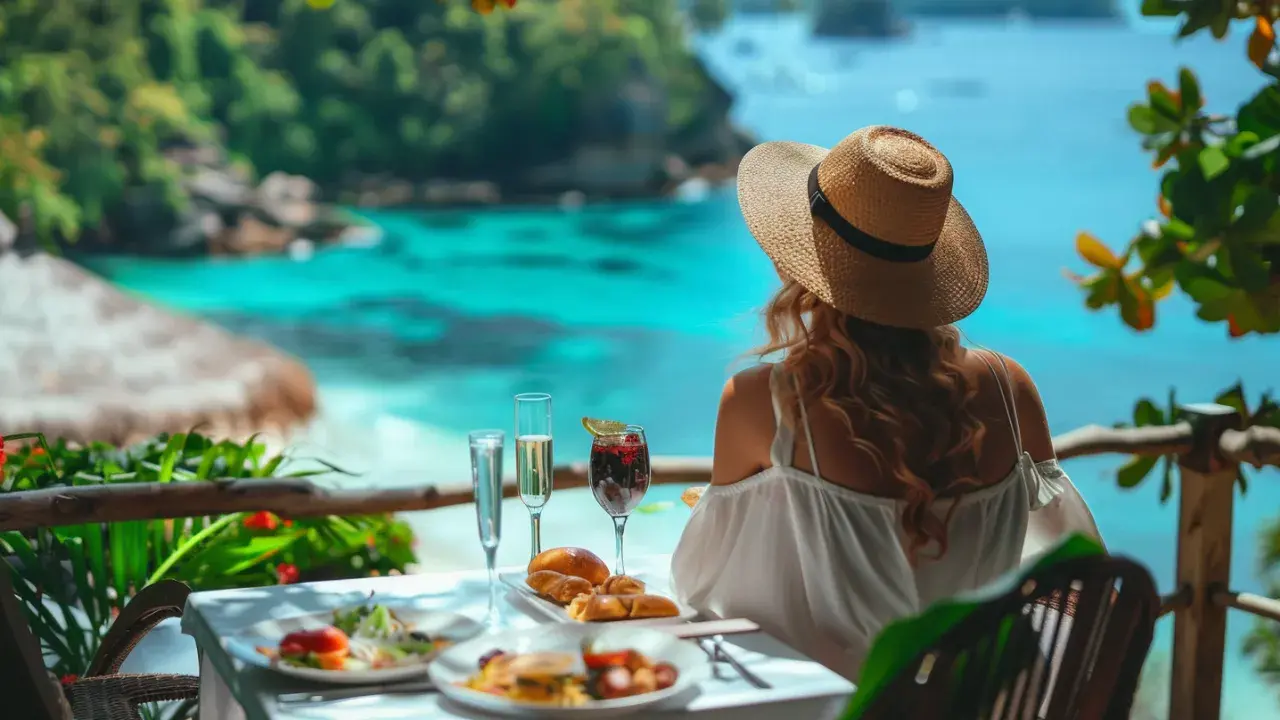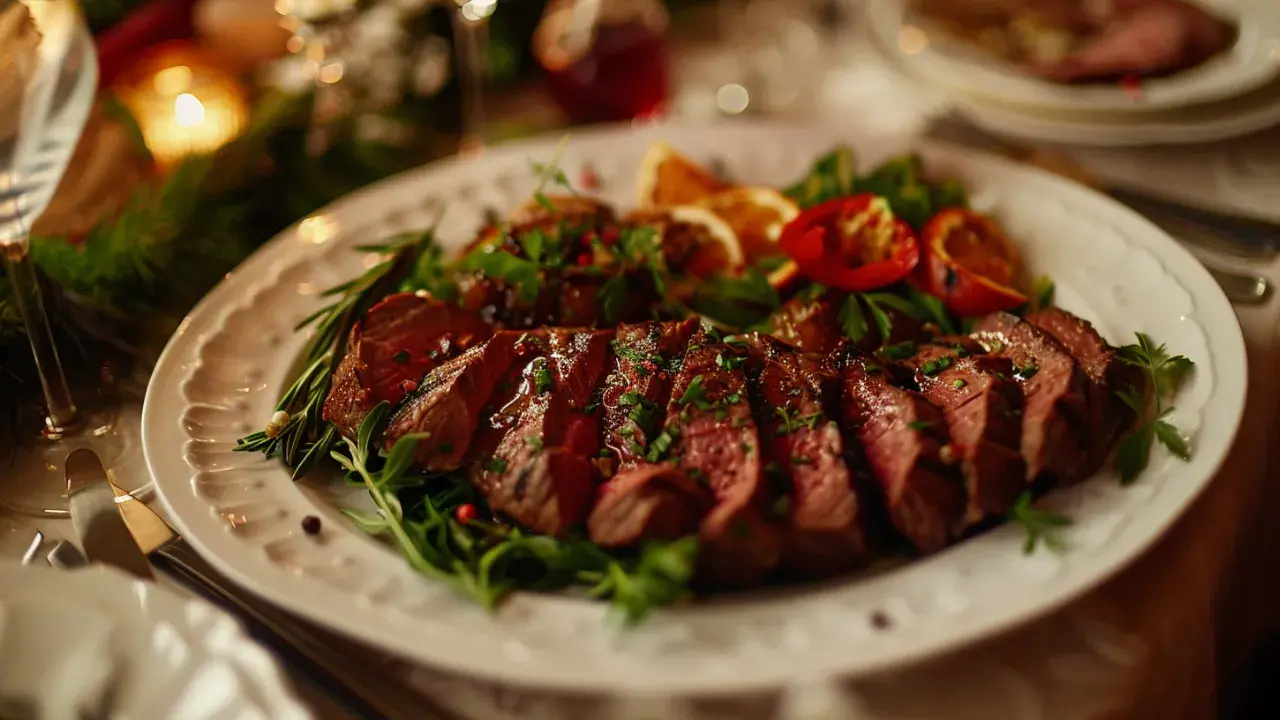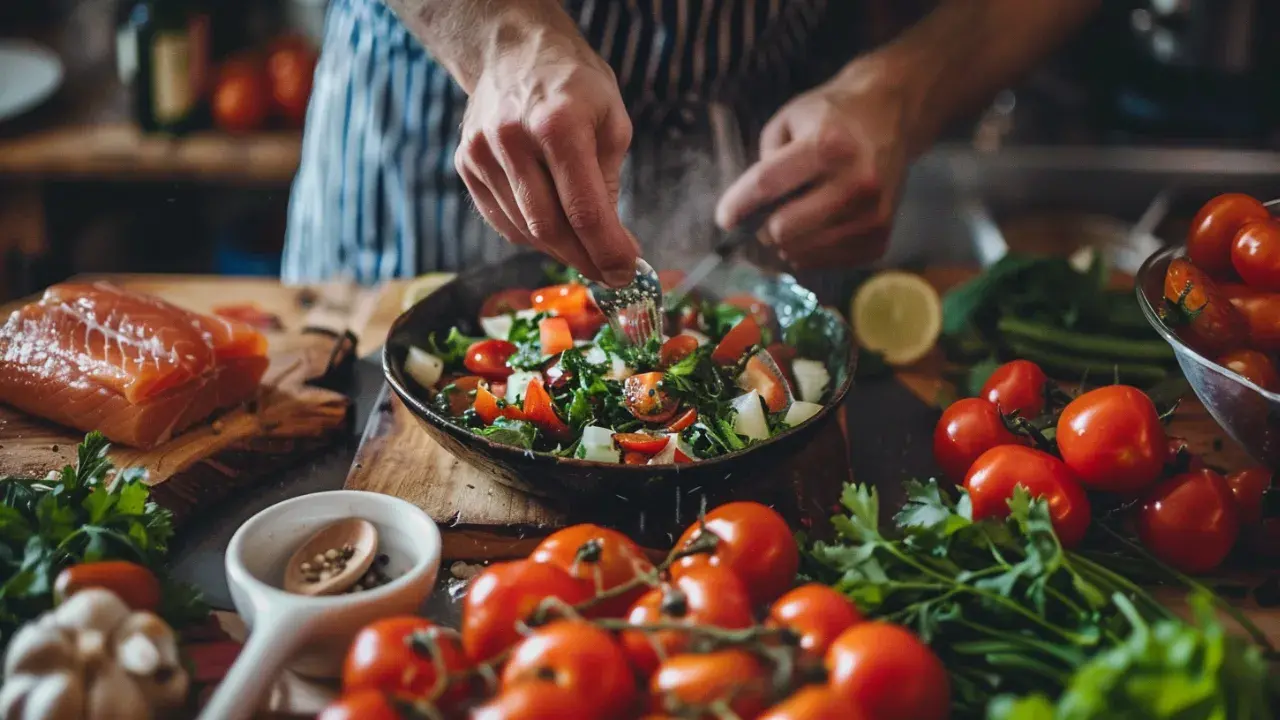How to Eat Healthy on Vacation | An Easy Guide
• Posted July 5 • 2024.
Imagine this: we are on a spectacular trip, a journey we've planned for months or years, and then we find ourselves facing the delicious local cuisine. How can we deny ourselves the pleasure of relishing its aromas and flavors? Wouldn't it be better to eat healthily during our trip while still indulging in the culinary delights of our travel destination? Absolutely! But often, we find guides that are complex or simply impossible to follow. That's why we've created this simple guide to answer the question we all ask ourselves when we take a well-deserved vacation... How to Eat Healthy on Vacation?
Plan Ahead for Your Meals
The first piece of advice we can offer is that enjoying a healthy trip starts well before you leave home, specifically when it comes to planning your meals in advance. Before heading off on vacation, take some time to research the restaurants in the area, their various food options, and tips shared by other travelers like you. This is easy to do online and will let you know in advance about the healthy and delicious options waiting for you at your destination. Whether you’ll be staying in a hotel or renting an Airbnb, find out what kind of food you’ll find there, always aiming for places that offer healthier options that suit your lifestyle.
You might also be interested in:
If you have the option to stay somewhere where you can prepare your own meals, that would be a big plus. This way, you can ensure you prepare and eat the healthy foods you already know and enjoy with the ingredients you prefer, and even try some new ones that you might not find at home. Additionally, local markets are hidden treasures that not only allow you to try fresh, regional products, but also provide a unique opportunity to interact with locals in a way that’s much more authentic than the average tourist. For this last point, I advise you to ask the staff at your hotel or your Airbnb host about the best places for this.
This preparation before leaving home will prove very useful during the trip and can relieve the stress of having to make decisions about what food to eat on the spot, allowing you to enjoy your vacation more. It’s important to mention that eating healthily on vacation does not mean you can’t occasionally try a local dish that may not be the healthiest option, but overall, knowing what food we will consume and where will allow us to have a plan and discipline to avoid coming home with a few extra pounds.
Smart Food Choices
When you're on vacation, the inevitable temptation to indulge in delicious but unhealthy dishes is usually quite strong. After all, you're on a trip, away from home, relaxed, and with a great opportunity to try delicious foods that you might not have access to at home. However, making smart choices about the foods you eat can make a significant difference in how you feel and look during and after your trip. A simple way is to opt for foods prepared in ways that preserve and enhance their natural qualities without adding unnecessary fat.
This means choosing meals that are roasted, steamed, or grilled, as these cooking techniques not only better preserve the nutrients in the food but also greatly reduce the amount of fat you consume, unlike fried or breaded dishes. When choosing meats, look for lean cuts; fresh fish will always be a good option, and chicken can be served in spectacular and very healthy ways.
Interestingly, another important aspect is the control of the sauces and dressings you consume with your food. By asking for sauces and dressings to be served on the side, you can better control the amount you consume. Remember, many dressings and sauces are flavorful but may be prepared with unhealthy ingredients.
Lastly, side dishes are incredibly important, not only in the culinary experience but also in healthy eating. It's generally a great idea to opt for healthier options like steamed vegetables, fresh salads, or whole grains instead of heavy sides like french fries or white rice. Remember that side dishes are not just complements to the main courses but also help keep you satisfied for longer and with more energy to enjoy your vacation.
Enjoy Local Cuisine, but Moderate Your Portions
Traveling offers a unique and close-up way to explore the diverse cultures of the world, and of course, one of the most direct and genuine ways to experience this is through local cuisine. It’s impossible to visit a new destination without trying some of its emblematic dishes, often prepared with recipes that are centuries or even millennia old. Indeed, not all these dishes can be considered the healthiest. However, enjoying these new flavors doesn't mean you have to compromise on good, healthy eating. With a few minor adjustments, you can savor the local delicacies without compromising your dietary goals.
First, as already mentioned, it is very important to make a careful selection of the dishes you want to try. Research in advance what the regional specialties are, especially those that are not only delicious but also nutritious. Around the world, traditional cuisines offer dishes based on fresh vegetables, legumes, and whole grains, which are both tasty and healthy. For example, if you visit a beach, the undeniable choice is fresh fish, trying to avoid fried options and opting for those that are grilled or charcoal-cooked without added fat. At this point, let me mention that living in one of the most beautiful coastal cities in the world, La Paz, Mexico, seafood prepared without fat is truly delicious and full of flavor; it's not necessary to eat something fried to enjoy the fresh flavors of the sea.
A tip we can certainly give is to order dishes to share with family or friends during the trip, which allows you to try a wider variety of local delights. It also helps you better control your portions, as you can taste many flavors without the need to consume a large amount of food. Great idea, isn’t it?
Another useful strategy, especially on vacation, is undoubtedly moderation. That is, we know we want to try everything, but it's important to listen to your body and recognize when you are satisfied. This will allow you not only to enjoy meals without stomach discomfort but also to enjoy your trip more, because it's not possible to enjoy vacations if you have unpleasant physical ailments, or if you need to keep Pepto Bismol at hand or always be on the lookout for a public restroom. Doesn't sound pleasant, right? So, moderation is an excellent idea.
Include a Special Meal
When you're on vacation, it's important to maintain healthy eating habits but also mix it with the pleasure of discovering new culinary experiences. A great way to do this is to allow yourself one or two special meals for each week of your stay, depending on its duration, which will determine the number of special meals you have. Designate a day or two in your itinerary to freely indulge in local flavors without worrying about calories or the composition of the food. It is important here to revisit the point of researching before the trip what types of food we will encounter at our destination because we know that in many places, spicy or intense ingredients can cause discomfort. To avoid this, it is advisable to already know which foods we should NOT eat and which we can, to fully enjoy our special meals.
Tip: If you travel to Mexico, do not take the advice of Mexicans regarding spiciness lightly, because when they say that a food is not spicy, it will be very spicy for you; when they say it's a little spicy, it will burn your tongue; and when they say something is very spicy, under no circumstances should you try it. Believe me, I learned this the hard way. If you are not accustomed, it's better to avoid spicy food.
Returning to the special meal, it will not only become a highlight of your trip but also a freedom to explore dishes that you may never try again in your life and which are therefore outside your regular diet (again, be careful with intense spices or heat) and thus taste the true flavor of the local cuisine.
However, it is important to remember not to turn this freedom into a license to overindulge for the entire vacation. If you keep to the limit of one or two special meals per week, you will maintain a very healthy diet for the rest of your trip and achieve your dietary and health goals. This idea helps you enjoy that special meal more peacefully without feeling guilty, because you know it's a planned and controlled pleasure.
Healthy Snacks
You're far from home, unfamiliar with the area, and more active than usual, so it's very likely that hunger will strike between main meals. An excellent way to manage this is to carry nutritious snacks with you. If the weather allows, you can carry fruits, or keep nuts or granola bars, which will not only provide you with energy but also help satisfy hunger between meals and prevent you from succumbing to less healthy options.
Fruits are a really smart choice because they are naturally sweet, rich in fiber, and full of vitamins. You can choose fruits that are easy to transport and do not require refrigeration, such as apples, bananas, or oranges, although in some very hot places, keeping them stored and not consuming them can make them less appealing by the end of the day. However, in other places, they are especially useful for long excursions or days of intense exploration, where access to healthy foods is quite limited.
Nuts are another incredibly practical snack. They are nutrient-dense, providing a good amount of protein, healthy fats, and fiber. A small handful can help satiate hunger. Plus, nuts have the enormous advantage of being easy to store and carry and require no preparation at all—just toss them in a bag and you're ready to go.
Another great option is granola bars made with whole grains, little sugar, and other natural ingredients. These bars are not only convenient but also taste good and can provide the energy you need to make it smoothly to the next meal.
When planning your snacks and if your trip allows it, also consider including some cut vegetables, such as carrots or celery, which are crunchy, refreshing, and taste great. These healthy snacks are perfect for those times when you just need something to nibble on and don't want to eat something more substantial, risking your eating habits.
Carrying these types of snacks when you travel is not only a great way to take care of your diet but also to gain the energy needed for the activities you have planned without experiencing the energy drops that often accompany fast food or other less healthy options. In other words, you'll have more energy to have fun and enjoy your vacation more.
Hydration
Staying hydrated might not seem like a big deal, but it's actually a crucial part of maintaining your health, especially when you're vacationing in warm climates where it's easy to dehydrate quickly, or when you're engaging in a lot of activities that make you sweat. As we know, drinking enough water helps maintain the optimal functioning of the human body, but it can also significantly improve your energy, your skin, and your ability to perform and enjoy daily activities.
We know that on a trip there are many refreshing options available and it's hard not to try them, but as a baseline, water should be your drink of choice during vacations. It contains no sugars, dyes, alcohol, or absolutely anything else, making it the naturally healthy option. It's a good idea to always carry a water bottle with you; it will keep you hydrated and, along with snacks, help keep hunger at bay. However, don't forget that it's very important to be aware of the water quality at your travel destination. In some places, the best option is to drink bottled water to avoid health issues. On the other hand, in many tourist destinations, especially in resorts and hotels, tap water is perfectly safe to drink, but again, it's best to find out before making the trip.
Do not overlook the importance of limiting your intake of sugary and alcoholic beverages. We know it's very tempting to enjoy a tropical cocktail by the pool or a cold drink at a local café, but like food, you should consume these in moderation to avoid adding extra calories to your diet, and these options can contribute to dehydration. For example, alcohol is a diuretic, which means it can increase fluid loss and dehydrate you. Always combine these drinks with plenty of water and remember to consume them in moderation, saving the more caloric ones to accompany your special meals, where you'll have the freedom to try everything without guilt or regret.
Finally, never underestimate the signs of dehydration: fatigue, headache, and dry mouth are just some of the indicators that you need to hydrate immediately. Staying hydrated will help ensure you have a much more pleasant and healthy experience during your travels and will also help you achieve your healthy eating goals. It's not just about health and nutrition, but about enabling you to perform all the activities you have planned for the trip.
Stay Active
Staying active during vacations may seem like it only contributes to your physical health, but it also enriches the travel experience itself. For example, exploring your destination on foot or by bicycle allows you to discover up-close details that other modes of transportation would make you miss, or participating in local activities such as festivals or dances can offer a more authentic and real perspective of the local culture. But as we mentioned at the beginning, it also allows you to stay physically well.
One of the simplest yet most enjoyable ways to stay active is walking. Walking through the streets of a new city, exploring natural trails, or simply taking a morning stroll along the beach is not only excellent exercise but also allows you to take a break, appreciate your surroundings more closely, and continue burning those calories we all detest.
If you prefer a more intense activity, you can rent a bicycle and discover hidden gems by pedaling, which also allows you to cover greater distances than you could simply by walking, thus exploring a larger part of the destination with the advantage of stopping anywhere to take a closer look.
Another excellent option is to participate in local exercise classes, whether those provided by the hotel or resort or those commonly found in many tourist destinations, which, in the case of the latter option, allow you to meet and interact with locals, enriching your trip while you practice yoga, pilates, or aerobics.
Engaging in physical activity during your trip is important not only for the benefits that exercise has for your body but also to combat the usual dietary excesses during periods of rest, which are almost inevitable. Thus, a combination of moderation, special meals, and physical activity will ensure that we all return in good shape from our well-deserved vacations.
In conclusion, when we travel on vacation, it is almost impossible not to try the delicacies that local cuisine has to offer us. In tourist places, both hotels and restaurants tempt us every day with exquisite dishes, but this does not mean that we should give in to excess. We have seen that there are ways to eat healthily without depriving ourselves of the delicious food that the destination offers. We just need to plan and choose wisely, be moderate, exercise, and on the day of our special meal, let ourselves go without any guilt or remorse.
To see more amazing pictures and leave a comment, go to the Pinterest board for this article: Click

Tastes of La Paz.




